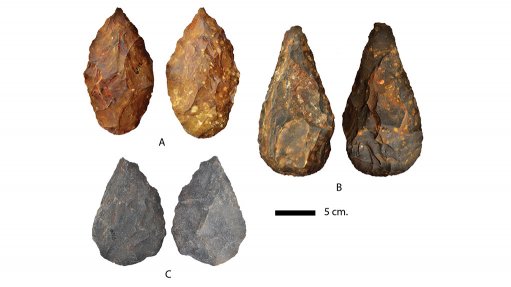
Excavations at an archaeological site at Kathu, in the Northern Cape, which is estimated to be between 700 000 and one-million years old, have uncovered “tens of thousands” of early stone-age artifacts, including hand axes and other tools.
The discoveries were made at the Kathu Townlands by archaeologists from the University of Cape Town (UCT) and the University of Toronto, in Canada, in collaboration with the McGregor Museum, in Kimberley.
The Townlands site was one component of a grouping of prehistoric sites known as the Kathu Complex. Other sites in the complex included Kathu Pan 1, which had produced fossils of animals such as elephants and hippos, as well as the earliest known evidence of tools used as spears some half-a-million years ago.
UCT Department of Archaeology archeologist Steven James Walker said the archeological group had been working “well” with developers and the South African Heritage Resources Agency to preserve the site, but added that the town of Kathu was rapidly expanding around the site.
“Today, Kathu is a major iron-mining centre. The fact that such an extensive prehistoric site is located in the middle of a zone of intensive development poses a unique challenge for archaeologists and developers to find strategies to work cooperatively,” he commented.
Emphasising the scientific challenge posed by the density of the traces of early human activity in this area, University of Toronto Archaeology Centre director Professor Michael Chazan said the landscape around the modern-day Kathu likely supported large populations of human ancestors, as well as large animals, such as hippos.
“All indications suggest that Kathu was much wetter, perhaps more like the Okavango Delta than the Kalahari. There is no question that the Kathu Complex presents unique opportunities to investigate the evolution of human ancestors in Southern Africa,” he maintained.